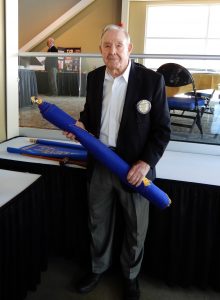Walter Burch, Preserving Our History: Rotary Club of Greensboro Oral History Project
by UNCG Special Collections and University Archives, Contributor
The Preserving Our History: Rotary Club of Greensboro oral history project is a collaboration between the Martha Blakeney Hodges Special Collections & University Archives and the Rotary Club of Greensboro. The project seeks to document the lives of Rotary Club of Greensboro members, as well as a wide variety of issues regarding the history of Greensboro, including economic shifts, race relations, the Great Depression, philanthropy, and religious diversity.
The first in a series of these to be spotlighted is Walter “Sticky” Burch, who has been a member of our club for 30 years. He is a sustaining Paul Harris Fellow and was honored as our Rotarian of the Year in 2008. Sticky celebrated his 99th birthday on October 21. He is still active, serving as a Sargent-At-Arms for most of our club meetings.
Walter “Sticky” Burch
 Interview conducted May 7, 2008, by Kathelene Smith, archivist with UNCG Special Collections and University Archives
Interview conducted May 7, 2008, by Kathelene Smith, archivist with UNCG Special Collections and University Archives
Walter “Sticky” Burch, originally from Asheville, North Carolina, spent much of his life serving in the Greensboro Police Department. Burch briefly describes his early life and military service in World War II. After the war, Burch returned to the Greensboro Police Department, and remained with the department for forty years. Burch has also been involved with the Rotary Club of Greensboro, the Oriental Shrine Club, and the One Hundred Club, an organization that brings together political and business leaders .
Through his role in the police department, Burch recounts the difficulties faced by Greensboro during the Civil Rights Movement. He also emphasizes the development of the police department, its struggles with corruption, and the power of crime, particularly bootlegging and gambling, in the history of Greensboro .
Burch focuses on the unique qualities of Greensboro—an academic environment, positive leadership, and a strong African-American population—that allowed the city to have relatively peaceful integration. Burch credits Jessie Jackson as a positive influence on Greensboro during the Civil Rights Movement, suggesting his nonviolent approach mirrored Martin Luther King, Jr. He highlights events, notably the Greensboro Massacre, that occurred throughout the 1970s and 1980s and marked this turbulent period in the city’s growth.
To read the full transcript of Sticky’s interview, click on Walter’s name below.
To review all of the oral histories, visit Oral Histories.
